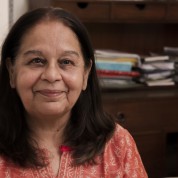
Renu Khanna
Co-Director
Society for Health Alternatives (SAHAJ)
I have over four decades of experience in gender equality and human rights related to health in general, and sexual and reproductive health in particular.
I have worked with and engaged in different capacities as a practitioner, as a researcher, as a mentor; with marginalized communities at the grassroots level, with civil society organisations and policymakers nationally. A few examples as follow:
• In 1984 I co-founded a community-based non-profit organization SAHAJ (Society for Health Alternatives) which began its work with the urban poor waste-picking women. Over the years SAHAJ has engaged with a range of civil and political rights issues of the urban poor, including sexual and reproductive health and rights (SRHR) of urban poor women and girls, adolescents and young people’s rights, and transformative masculinities. More recently, SAHAJ is working on a collaborative SRHR programme with an intersectional perspective, with young people from marginalized communities (Dalit, Adivasi, trans women and “men who have sex with men” and girls living with disabilities.)
• I worked in a tribal district, with very poor development indicators, for over 18 years. We developed a community-based women’s health programme incorporating indigenous knowledge and feminist methodologies.
• For 15 years I worked with the Public Health Department of the Bombay Municipal Corporation as a Co-Principal Investigator in a series of collaborative projects with the Liverpool School of Tropical Medicine (LSTM), UK, and the Royal Tropical Institute (KIT) Amsterdam. Currently, I am the Vice Chair of Advisory Group of ARISE Consortium led by the LSTM
• I taught a course on Gender, Health and Rights at the Azim Premji University, a leading University in India (for MA Development Studies students in 2021 and 2022), and guide research of students and community-based organisations.
In addition to my ‘practitioner’ commitments, I am active in several pro-people’s movements, including feminist and SRHR movements and coalitions – within India, regionally and globally. Because of my active engagements with these movements, I am well able to translate and amplify the grassroots lessons learnt into possible policy measures.
Over the years, I have contributed to several UN organisations. Currently, I am a Lancet Commissioner for Gender and Global Health, a member of the Gender Advisory Panel of WHO, and a Distinguished Fellow at the George Institute, Australia.
26
Jan
PL3
06.30 - 07.30 (BKK)

